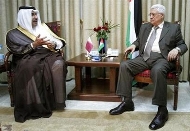
Qatari Foreign Minister Sheikh Hamad bin Jassem al Thani left the Gaza Strip early Tuesday after the latest stage of negotiations between Hamas and Fateh leaders ended without an agreement. The talks between the presidency and the government had focused on Qatar’s six point plan for a Palestinian unity government, introduced Monday in order to quell the recent upsurge in violence between Hamas and Fateh and return Palestinians and Israelis to the negotiating table.
Sheikh Hamad met separately with Palestinian President Mahmoud Abbas and Palestinian Prime Minister Ismail Haniyyeh in Gaza Monday evening, but a three way meeting was never held.
Abbas aide and PLO Executive Committee member Yasser Abed Rabbo cited the significance of these talks, calling the Qatari initiative “the last political effort that is being exerted and the opportunity must be seized because the alternative is to hold early elections.” But after a night of continued deadlock, Abed Rabbo told reporters, “The differences on the core issues have remained…It does not seem as if we are closer to an agreement.”
The Qatari proposal is composed of the following six points:
That the Palestinian government abides by international resolutions
That the Palestinian government abides by agreements signed by the PLO, including those signed with Israel.
The guarantee of the establishment of a contiguous Palestinian state on the 1967 borders alongside Israel in accordance with the speech of US President George W. Bush.
To agree to mutually and concurrently halt all forms of violence.
To work to reactivate the PLO in accordance with the Cairo Agreement.
The Qatari foreign minister has also pledged to work towards the release of captured Israeli soldier Gilad Shalit as part of its bid to become a key player in the Middle East peace process.
According to Ahmed Yousef, a senior aide to Prime Minister Haniyyeh, Haniyyeh rejected the proposal because of two points in the initiative, including agreement to a two-state solution and the agreement to halt all forms of violence. The issue of recognizing Israel remains the primary stumbling block.
“As Islamists we cannot accept this and any proposal that includes this means we’re heading toward a deadlock,” Yousef told Reuters.
Although the Qatari foreign minister left this morning, Qatari mediation is expected to continue. While Abbas refused to meet with Haniyyeh on Monday, government spokesman Ghazi Hamad said efforts were underway to arrange a meeting between the men on Tuesday.
Traditionally, conflict mediation between Israel and the Palestinians has been conducted by Egypt, Jordan, and Saudi Arabia, but the small Gulf nation of Qatar seems intent on becoming a key player in any new Mideast negotiations.
Qatar has also made diplomatic overtures to warring factions in Sudan’s Darfur region in an effort to bring the conflict there to an end. According to Sudan’s presidential adviser Mustafa Osman Ismail, warring groups in Darfur will be invited to a conference in Doha, Qatar’s capital.
According to Reuters reports, Qatar is using ‘check book diplomacy’ as a means to gain political influence in the region. The wealthy Gulf nation is not only a major investor in Sudan’s economy, but is also a cash supplier for Hamas.
In recent months, Qatar’s relationship with many neighbouring Arab countries has turned cool---and many Arab leaders have accused Qatar of privileging its own interests above the interests of the Arab community.
Earlier this month, Qatar voted against a Jordanian prince to head the United Nations, a move which angered the Hashemite Kingdom. Jordan recalled its ambassador to Doha to protest the vote, which it claimed violated a previous Arab agreement to support the candidate in his bid to head the UN.
Two weeks ago, Israeli news sources reported that Israeli government officials had met with top Saudi Officials. For Qatar, which hosts an Israeli trade mission and whose foreign minister meets regularly with the Israelis, this was seen as a threat to their influence over future negotiations.
According to Mohammad Sa’id Idrees of the Al-Ahram Centre for Strategic Studies, “Qatar feels squeezed by the Saudis and obsessed with fear that the kingdom will swallow it one day.”







